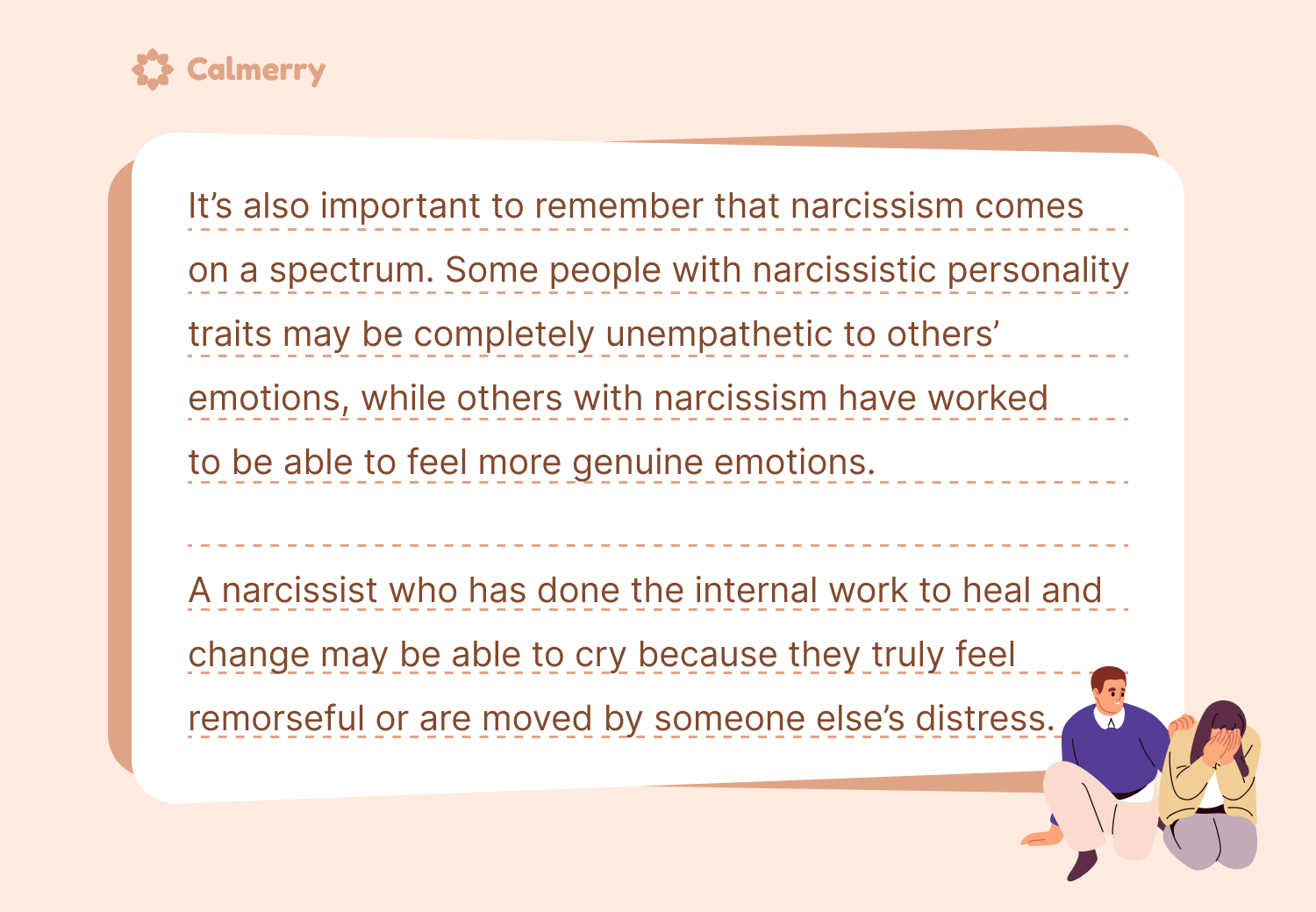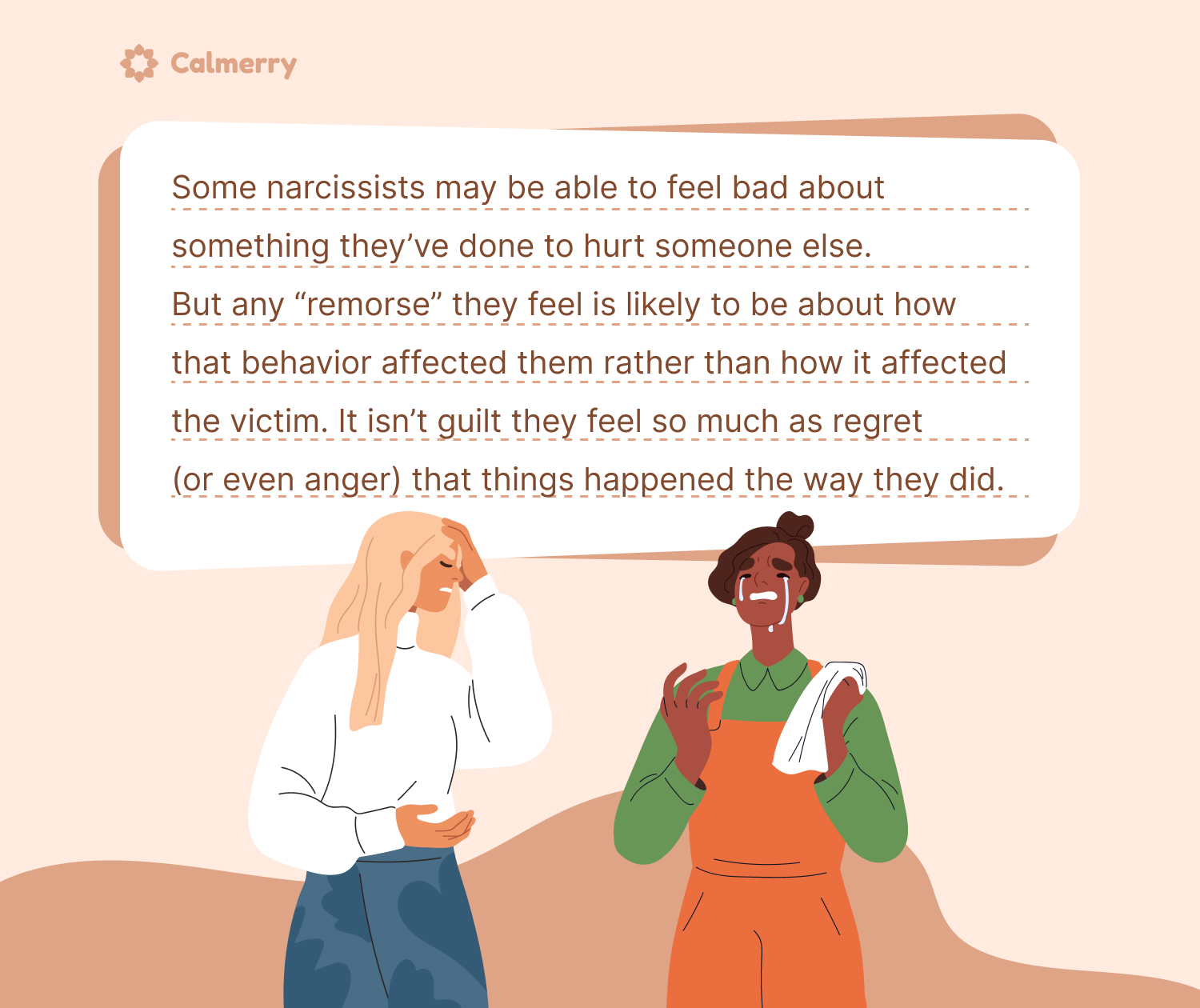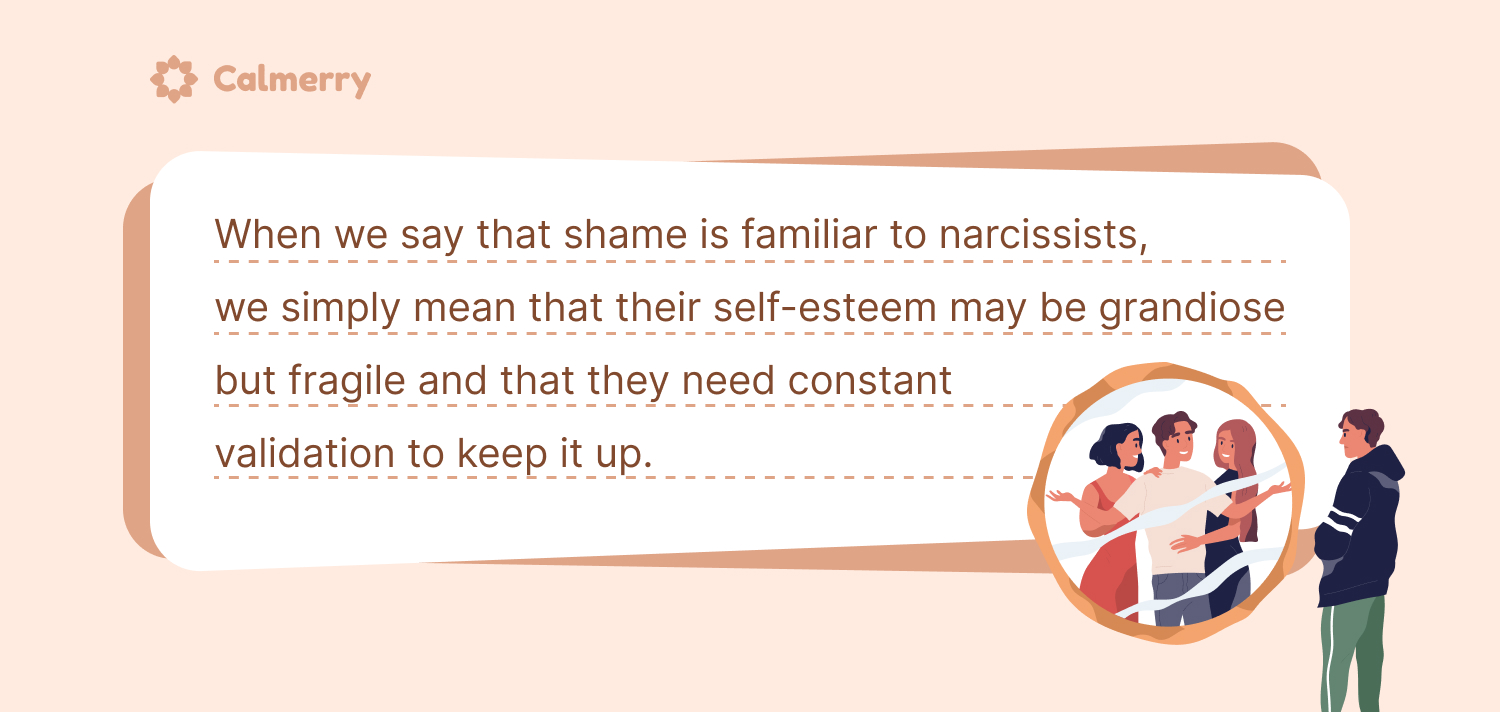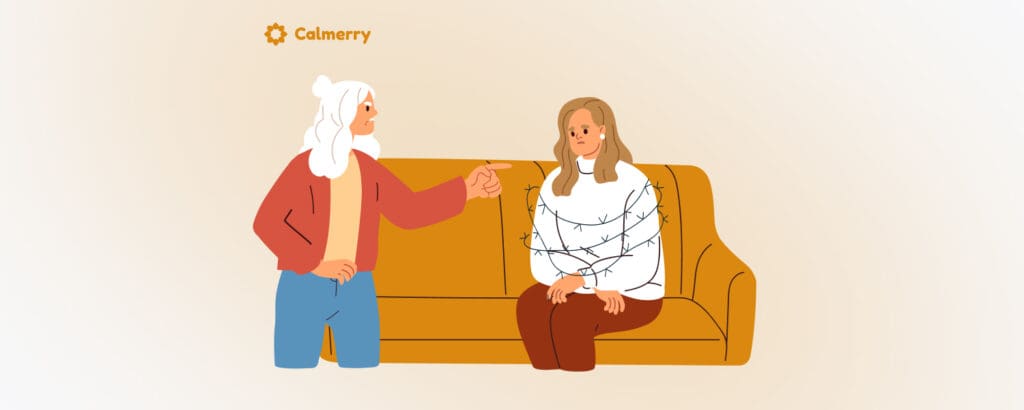Do Narcissists Cry, Feel Guilty, Regret, Love, and Apologize?

In this article
Narcissism is a maladaptive personality trait that causes people to be self-centered and lack empathy. These traits come on a scale – at the most extreme levels, someone who is narcissistic may be diagnosed with narcissistic personality disorder, a serious mental health condition that requires treatment.
It’s painful to have someone with a narcissistic personality in your life. It might seem to you like this person is incapable of caring about anyone else but themselves. You even might feel like everything they do is to manipulate or belittle you.
You might wonder – do narcissists ever suffer? Do they feel anything? Do they feel regret? Does he even love me at all?
The truth is that narcissists do cry, apologize, and feel regret – but not in the ways that you might wait from them.
Do narcissists cry?
People with narcissistic personality traits, or even narcissistic personality disorder (NPD), certainly can and do cry. But it might not be for the same reasons as someone who isn’t affected by narcissism.
All of us, including people with NPD, cry for various reasons. For example, you might cry because of grief or sadness. But you might also cry because you’re embarrassed, angry, moved, frustrated, and more. The same goes for people with narcissistic traits.
On top of that, crying or the ability to cry doesn’t necessarily indicate empathy (or a lack thereof). A lot of people have a hard time crying, but that doesn’t mean they can have narcissistic tendencies. There are many reasons why people have a hard time expressing themselves through crying.
It’s also important to remember that narcissism comes on a spectrum. Some people with narcissistic personality traits may be completely unempathetic to others’ emotions, while others have worked to be able to feel more genuine emotions.
A narcissist who has done the internal work to heal and change may be able to cry because they truly feel remorseful or are moved by someone else’s distress.
Even people with narcissism who lack empathy for others may cry for different reasons. For example, they cry, but behind that emotion is anger. They may cry because they feel victimized or wrongly accused.

You might also see a narcissistic cry when something happens that affects their sense of superiority and important self-image. For example, take a narcissistic person who’s been fired from an important job. They might cry because of the shame, and they are emotionally unable to cope with that blow to their ego.
A narcissist who falls into the vulnerable subtype might be more likely to cry because they feel insecure. They might be so resentful of other people’s success and cry due to hopelessness or despair.
When a narcissist cries, is it genuine?
Loved ones who see a narcissistic person crying often wonder if it’s genuine. Are they crying because they genuinely feel bad, or are they crying to get sympathy or support?
Again, it depends. Narcissists tend to cry “crocodile tears” to garner sympathy or as a form of manipulation.
For example, a person with NPD may cry to convince someone to stay in a toxic relationship with them. A person with narcissism might also cry to make themselves appear victimized, to evoke guilt in others, as a means of control, and more.
But this doesn’t mean it’s never genuine when a narcissistic person cries. Someone with NPD may be able to change their habits through face-to-face or online therapy and other types of treatment.
But, generally, untreated narcissists feel and behave in ways that serve them, not others. If you feel that a narcissistic person is crying fake tears to manipulate you, then that’s an important instinct to listen to.
– Saya Des Marais, MSW, Therapist-turned-mental health writer
Do narcissists feel guilt?
Another question that many people have is whether narcissists feel guilt, shame, or remorse. It’s commonly known that, like people with antisocial personality disorder (also known as sociopathy), narcissistic people aren’t able to feel remorse when they hurt someone.
But this isn’t necessarily true all the time. Some narcissists may be able to feel bad about something they’ve done to hurt someone else. It isn’t guilt they feel, so much as regret (or even anger) that things happened the way they did. But any “remorse” they feel is likely to be about how that behavior affected them rather than how it affected the victim.
Let’s take the example above, a narcissistic person who loses their important job title. If they made a big mistake in causing this termination of employment, then they may feel remorseful or regretful about it.
That doesn’t necessarily mean they feel empathetic and guilty about how their mistake affected others. It just means that they may regret that the mistake they made has caused them to lose such an important job title that served their self-interests.

Narcissists have an all-important sense of self that must be preserved at all costs. They’re known to warp reality to fit in with who they believe themselves to be (important, great, superior, etc.).
So even if they’ve seriously hurt or abused someone, they may alter the truth and tell themselves a different story – one in which they are the victim, not the abuser. This coping strategy allows them to escape any feeling of remorse, blame, or guilt.
Do narcissists feel shame?
As for shame, this is a feeling that is, at least deep down, intimately familiar to many narcissists. One could say that their entire existence is based on avoiding this feeling of shame – a feeling that constantly torments them. This shame is part of why narcissists need such constant adoration and praise.
One study found that people who scored high on the vulnerable subtype of narcissism, in particular, were more likely to feel shame.
To be clear, this doesn’t mean narcissists feel ashamed of themselves for hurting others or behaving the way they do. Shame isn’t the same thing as guilt or remorse.
When we say shame is familiar to narcissists, we simply mean that their self-esteem may be grandiose but fragile, and they need constant validation to keep it up.
However, narcissists despise this feeling of shame. It’s like they’ll do everything to cope by avoiding it, such as projecting blame on others or exploding with rage.

The important thing to remember is that when you’re dealing with someone with untreated narcissism, whatever emotions they feel or claim to feel – it’s about them and their needs, never about yours.
– Saya Des Marais, MSW, Therapist-turned-mental health writer
Do narcissists ever apologize?
You might have heard that a narcissist never apologizes. This isn’t necessarily true – narcissists do sometimes apologize, but not in the way that is expected. Narcissists have a hard time showing empathy for others’ emotions. And are also prone to manipulating others for their own benefit. So it makes sense that their “apologies” typically reflect these traits.
If you’re waiting for them to apologize for the harm they’ve caused you sincerely, be prepared to wait for quite some time. Although narcissistic people can apologize, they’re more likely to do so for their own benefit rather than out of genuine remorse.
For example, a narcissist might offer an insincere apology to get something in return. They might apologize to make themselves out in a victim position or to repair the damage that’s been done to their image.
There are narcissists who don’t apologize for their actions. Their pride is likely to prevent them from offering a sincere apology. Also, they simply may not be able to admit any wrongdoing on their part.
But do narcissists love?
If you are in a relationship with a narcissistic person, whether it’s an intimate relationship, a friendship, or a family relationship, you’ve probably wondered time and time again whether this person truly loves you or whether they’re capable of feeling love to anyone at all.
The answer to this depends greatly on the extent to which narcissistic personality traits affect your loved one. But for people with NPD, their symptoms – like being unable or unwilling to feel empathy for others and manipulating others for personal gain – make it highly unlikely that they can love others the same way as non-narcissistic people.
That doesn’t mean that these people don’t fall in love. They may experience strong attraction or emotions toward someone else. Relationships with narcissists tend to be intense and can even be traumatic. Research has shown that narcissists can be successful in short-term dating but not in long-term romantic relationships.
Your narcissistic loved one may be highly prone to jealousy or fits of rage. You might find yourself “love-bombed” or gaslit. They may shower you with grand gestures of affection – but these gestures serve them and their needs for adoration. Unfortunately, they’re not really done for you.
Do narcissists love their children?
It can be extremely painful to have a parent with NPD. You might have wondered throughout your life if your parent truly loves you or whether even their relationship and interactions with you are self-serving in some way.
It can be a hard truth to accept. But if you believe that empathy is a critical component of love, and most people do, then we can conclude that untreated narcissists aren’t able to love anyone, even their children, because of their inability to have empathy.
Narcissistic parents are likely to behave in all of the same ways, like using emotional manipulation tactics and being jealous or possessive of their children. Narcissistic parents also tend to see their children as an extension of themselves, and any independence may be perceived as competition or a threat.
Your situation is unique, and narcissism comes on a spectrum. The only person who can help you figure out whether or not a narcissistic loved one truly loves you is a qualified mental health professional who has been a witness to your unique relationship.
– Saya Des Marais, MSW, Therapist-turned-mental health writer
Do narcissists know they are hurting you?
Narcissists may or may not be aware of the emotional pain they inflict on others. And their level of awareness can vary depending on the individual and the severity of their narcissistic traits.
Here are some possible scenarios:
- Unaware due to lack of empathy. As a result, they may not realize the impact of their actions or words on those around them.
- Aware but unconcerned. Some narcissists may be aware that they are causing distress, but they may not care because their primary focus is on their own needs and desires. They may prioritize their own well-being over the well-being of others.
- Aware and using it as a tactic. In some cases, narcissists may deliberately hurt others as a means of controlling or manipulating them. They may use emotional pain as a tool to keep others dependent on them or to maintain a sense of power in the relationship.
- Aware but in denial. Some narcissists may have a vague awareness that their behavior is harmful, but they may be in denial about the extent of the damage they cause. They may minimize, justify, or rationalize their actions to avoid taking responsibility.
Regardless of whether a narcissist is aware of the pain they inflict, their behavior is still harmful and unacceptable.
Mental health help for the narcissistic person and loved ones
The good news is that narcissists can learn how to have empathy with treatment. The problem is that the very traits of narcissism don’t typically lend themselves toward accepting treatment. But if they stick with it and are open to growth, then they can change.
In the meantime, you also deserve support as someone in a relationship with a person with narcissistic traits. It’s essential to prioritize your own well-being.
Therapy on Calmerry can help you explore how this relationship has affected you and learn new and healthier ways to relate (or not relate) to this person.
Start with a 10-minute questionnaire – and get matched with your therapist in 1 hour.
online therapy
live video session


